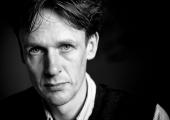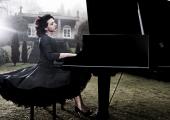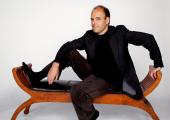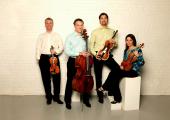Profound experience of 2010? For me, unquestionably, portions of the great Russian pianist Elisabeth Leonskaja's first-time journey through all the Schubert sonatas at the Verbier Festival. I was lucky to catch three out of nine recitals, and to talk to her about Schubert. I'd have been happy to listen again to any of those extraordinary works - all 19 are loveably idiosyncratic - in London. But this was a strand of unusual radiance I hadn't caught at Verbier embracing, as ever, Schubert's deepest sorrow in a late piece served up as prelude, the meltingly beautiful A-major Sonata D664 and that Olympus of Schubertian difficulty, the Wanderer Fantasy.
There's a parallel, of course, between the way Schubert can subject a simple-seeming phrase to endless, discreetly emotional harmonic tweaks and Leonskaja's unfussy evasion of simple repetition when faced with the same idea. And we do hear both Schubert's variations on the opening unison theme of the D915 Allegretto in C minor and their reiteration an awful lot. A delicious lot, to be precise: Leonskaja follows the great source of so much of her inspiration, her mentor and duo partner Sviatoslav Richter, in observing all repeats (his response to a student who didn't, which she quoted expressively to me in the interview, "You don't love Schubert?", seems as good a response as any to false economy). And quite apart from the expressive differences she makes in the repeats, there are always long-term gains.
Take the glowing A-major song of the D664 Sonata's first movement (that Schubert composed it in his early twenties is a miracle in itself). You may even begin to feel it's creeping back once too often - though you will never lose concentration as a listener when Leonskaja plays - but then comes the benediction in the coda, stilling and sublime: the Lied's arpeggiating accompaniment becomes a chordal blessing. Without that longer span, it wouldn't have half the impact. Nor would the shorter, unrepeated but never emotionally lightweight Andante, shifting subtly into unexpected regions. And Leonskaja's epic-lyric balance then sends the Allegro finale soaring, swooping and waltzing into relatively clear blue skies.
All this held the listeners captive, with barely a shuffle, for the first 40 minutes. There was the same connection between intermezzo and sonata, and between the movements of the sonata, with the audience held rapt by Leonskaja's effortlessly profound musicianship, as we'd witnessed, spellbound, in the Chopin recital of 2009 that first made me realise this was one of the few great pianists left after Richter.
Quite a different cradling of life's sadness comes in the day and night of the Wanderer Fantasy. It's a daunting challenge in any programme, and it did mean a jolt from the more private Schubert which Leonskaja seems to understand better than any living pianist. But she is also a comprehensive stylist, with the weighty orchestral pianism of the Russian school keeping bass lines dauntingly clear among the welter of notes. Not that she hits every single one of them; nor did Schnabel, Cortot, Richter, Gilels or many of the other piano titans. But like them she keeps a magisterial sense of where we're going, and the forceful fugue really did crown the work.
Apt, too, that after this Leonskaja should have chosen to end with a composer impressed by the flashier side of Schubert's early Romanticism - birthday boy Franz Liszt, and a typically eloquent song without words, his "Petrarch Sonnet No 104". But I have to say my heart was still with Schubert in tenderest A-major mode.
Overleaf: Leonskaja plays the finale of Beethoven's "Tempest" Sonata as a concert encore










